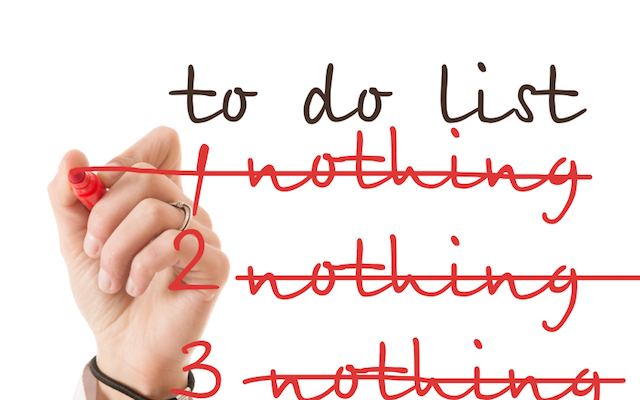If there’s one thing you’re not supposed to do in our culture, it’s nothing. Idleness is socially discouraged, frowned upon, mistrusted, seen as wasteful and self-indulgent. Yet research has shown that it’s essential to our health, happiness, and productivity.
So in this installment of The Living Experiment, we’re talking about those all-too-rare moments when we allow ourselves to do nothing in particular — and the surprising magic they can bring to our lives.
From the neurological rewards of daydreaming to the value of extended sabbaticals, we explore the possibilities of doing less, rather than more, as a means of enriching your life and elevating your contributions to the world around you.
We also offer some experiments designed to help you experience the counterintuitive rewards of idleness for yourself.
Be OK With Nothing
- When it looks like you’re doing nothing you are probably accomplishing far more than you realize.
- The moment you pull your attention away from overtly productive, focused tasks and allow your attention to drift, your brain’s default mode network (DMN) kicks into high gear. This is the neurological state in which the big insights and “ahas” happen.
- When you don’t give your brain time to do background sorting and filing, your mental “inbox” starts to overflow. You may experience that as stress, fatigue, irritability, or a noticeable decline in memory, focus, and cognitive capacity.
- Many of history’s great minds, including Albert Einstein and Thomas Edison, built frequent walks, naps, and daydreaming opportunities into their schedules, instinctively recognizing that their DMN often produced better results than their active mental efforts.
Interrupt Inflammation
- Forced-march productivity doesn’t just harm your brain and rob you of your daily pleasure in living: It also releases a cascade of pro-inflammatory, stress-associated hormones like cortisol and adrenaline.
- When you pull your foot off the gas, you give your body a chance to process metabolic waste and rebalance its biochemistry. Undirected or at rest, your body begins releasing biochemicals that encourage digestion, calm, and repair.
- If you plug into your electronic devices and media or do busywork every time you have a free moment, you are robbing your body–mind of this important repair opportunity. You’re also limiting the potential of your own DMN.
Reclaim Idle Moments
- Make a conscious decision to live as a human being rather than a “human doing.” Reject the idea that you must always be producing. Be willing to challenge your own perceptions and stories about what you “have to do.”
- Build ultradian rhythm breaks (or URBs, as Pilar refers to them) into your workdays. A 20-minute break every hour and a half to two hours can produce dramatic results. (Learn more about URBs in our “Pause” episode.)
- Don’t relegate your time off to vacations and weekends. Reclaim some moments daily: first thing upon waking (listen to our “Morning” episode for tips), midday, before bed. As you build more idle time into your days, you will likely find that you’re enjoying your life more and — surprise! — accomplishing more of what makes your life feel worthwhile.
Experiments
Pilar suggests:
Pick a simple task you are going to do anyway (such as washing a cup, folding a piece of laundry, or walking from car to house), and slow yourself down so that it takes you 30 seconds longer than normal. Notice how unfamiliar it is to move at that pace, and how it shifts your mental and physical attitude into the present moment.
Dallas suggests:
In the next two weeks, schedule 30 minutes to walk or sit and just let your mind wander. Don’t read, don’t answer texts, don’t browse social media, don’t meet with a friend, don’t meditate. Just be. Notice what thoughts and feelings arise.




This Post Has 0 Comments